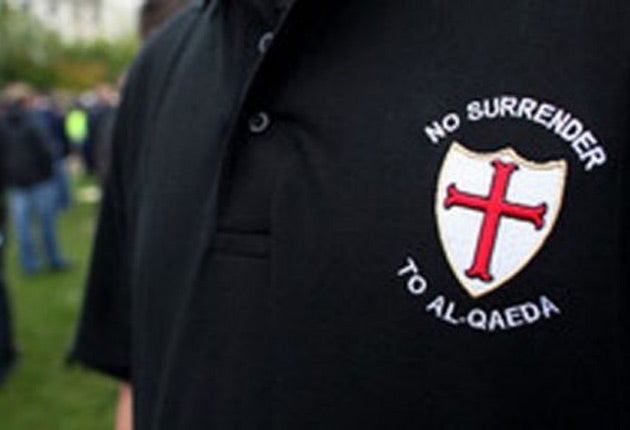Last Night's TV: Sectioned, BBC4<br />Young, British and Angry, BBC3

Sectioned began with a broadcaster's Get-out-of-Jail-Free card. "All the patients appearing in this film were constantly monitored by their healthcare team," it said, "who considered them mentally well enough to take part." We're not exploiting them, in other words. And then, just in case you might still have doubts about the ethical probity of the enterprise, all three of the men who appeared in the film were shown giving their permission orally, on camera. Which still didn't entirely resolve the doubts, to be honest. Given that Richard believes the gods have told him to commit suicide on Christmas Day on the grounds that he'll be able to go to Hell, get a spiritual top-up and then commence his training as King of England, you couldn't help but feel that his capacity to sign any kind of consent form might be a touch impaired. The other two patients – Andrew, a former NHS consultant who'd been compulsorily admitted after leading three police cars in a high-speed chase, and Anthony, who has paranoid schizophrenia – both appeared more rational, but still raised the issue of whether permission granted during a period of lucidity could extend, weeks later, to a moment of greater vulnerability.
Which made it reassuring that there wasn't a whisper of prurience or exploitation in Ben Anthony's film. It would be dishonest to say that its interest was uncoloured by human curiosity – the kind of vertiginous fascination that serious mental derangement can induce. But what there was lay on our side of the screen. On their side, there was a serious attempt to show how serious mental illness can be treated, and to remind viewers that insanity has an exit door. It also intriguingly touched on the blurring of mind and identity that can cause problems in the public attitude to mental illness. Standing at a bus stop after his release, Andrew (a man who talked with analytical clarity about his own condition) confessed that getting better could have its depressing side: "I'm beginning to remember all sorts of people that I went to see and things that I said and did that were not me," he said ruefully. The cliché of dispossession he reached for echoed the one used earlier by his doctor, when he talked of a time "when you were not yourself". If not himself, though, who was he exactly? Anthony, by contrast, felt that what counted as the real him to his doctors (his medicated state) – wasn't himself at all – and yearned to get off the drugs. The final frames revealed that, having got his wish, he appeared to be slipping back into distraction.
Richard was the saddest case, a man for whom madness was almost a rational response to what he'd endured while still sane. When he was six he'd had a pan of boiling chip fat hurled over his head by one of his mother's boyfriends, the scars from which were still visible. At secondary school, he'd been sexually abused by a teacher, and those marks hadn't faded either. Added to which, he enthusiastically self-medicated with anything he could get hold of on his brief furloughs from institutionalisation, including vodka, speed and heroin. Around all of these people ripples of unhappiness and distress spread out, a fact that was the occasion for the one crass note in an otherwise sensitive and thoughtful documentary. "Does it take its toll on you?" an off-camera voice asked Andrew's wife, a woman who had had to cope with her husband's manic inspirations. You won't be greatly surprised to learn that it did, and that she looked as dazed and exhausted in "good" mental health as her husband did in the depths of his depression.
Young, British and Angry reminded you that paranoia and irrational rage are hardly exclusive qualities of the mentally fragile, but can also be shared by notionally sane people too. Ben Anderson's film explored the sudden flourishing of the English Defence League, a protest group that had its origins in a nasty little face-off during a homecoming march-past in Luton, after a group of Islamic extremists had insulted returning soldiers. The spontaneous outrage caused by that protest somehow expanded into the English Defence League, a grubby snowball of racism, xenophobia and nostalgic hooliganism, which has picked up all kinds of oddities in its onward trundle. Essentially, though, this is an organisation for lovers of Ingerland, that realm of the mind in which the flag of St George flies on every corner and England win in the closing seconds.
The EDL insists that it isn't racist, and it seems they have at least one black member, one lapsed Muslim and one Sikh to prove it (we saw them all here and they were very easy to spot, in what was otherwise an unbroken sea of crop-headed whites). Not all EDL supporters seem to understand this though, since Anderson recorded nasty racist abuse at every demonstration he attended. His film included a wonderfully awkward scene in which one of the founders of the EDL attempted to explain how he had been "hoodwinked" into nominating a BNP candidate for a local election, pausing briefly during his clarification to call up his mixed-race daughter, who suddenly appeared from around a corner to stand alongside him, as a mute credential to his multi-racial open-mindedness. The demo footage also demonstrated, incidentally, that what the police call "kettling" is a matchless technique for taking an essentially tepid mob and bringing it rapidly to boiling point. Perhaps a kettle isn't the best idea.
t.sutcliffe@independent.co.uk
Join our commenting forum
Join thought-provoking conversations, follow other Independent readers and see their replies
Comments
Bookmark popover
Removed from bookmarks